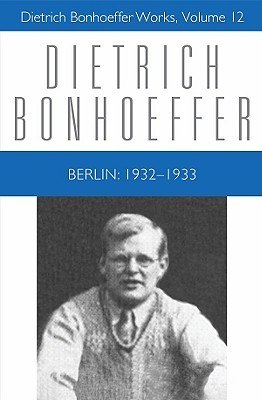- Bible
- Read the Bible
- Bible Versions
- Verse of the Day
- Reading Plans
- Verses by Topic
- Books of the Bible
- Bible Images
- Study
- Commentaries
- Concordances
- Dictionaries
- Encyclopedias
- Sermons
- Bible Atlas & Maps
- BP Wiki
- Devotionals
- Today's Devotionals
- Light of the World
- All Devotionals
- Inspirational Quotes
- More
- Picture Quotes
- Videos
- Inspirational
- Bible Study
- What The Bible Says
- Bible Q&As
- Daily Bread
- Bible by Genre
- Bible Stories
- Random Bible Verse
- Community
- Store
Berlin: 1932 - 1933: Dietrich Bonhoeffer Works, Volume 12
by Dietrich Bonhoeffer
Then came the crisis of 1933. This is Bonhoeffer's own phrase in a letter that documents a turning point in his own life as well as that of the nation. Of Bonhoeffer's own life at this time, his biographer writes, The period of learning and roaming from 1928 until 1931 had come to an end as the young lecturer, age 26, began to teach on a faculty whose theology he did not share and to preach in a church whose self-confidence he regarded as unfounded. Bonhoeffer was becoming part of a society that was moving toward political, social, and economic chaos.
Events moved quickly at the onset of 1933 in Berlin. In only one hundred days the path was cleared by the German Parliament and the Nazi Party for the establishment of the fascist dictatorship. These one hundred days, as well as the preceding and succeeding months, are reflected in the materials in this volume: in letters, in sermons, in Bonhoeffer's university teaching, in manifestos and a church confession, and in his proactive engagement in the developing church struggle. The vast majority of these are translated here for the first time.
Events moved quickly at the onset of 1933 in Berlin. In only one hundred days the path was cleared by the German Parliament and the Nazi Party for the establishment of the fascist dictatorship. These one hundred days, as well as the preceding and succeeding months, are reflected in the materials in this volume: in letters, in sermons, in Bonhoeffer's university teaching, in manifestos and a church confession, and in his proactive engagement in the developing church struggle. The vast majority of these are translated here for the first time.
BUY NOW
Hardcover, 680 pages
Published September 30th 2009 by Fortress Press (first published 1997)
© 2025 Bibleportal.com All rights reserved.

Dietrich Bonhoeffer was a German Lutheran pastor and theologian. He was also a participant in the German Resistance movement against Nazism, a founding member of the Confessing Church. His involvement in plans by members of the Abwehr (the German Military Intelligence Office) to assassinate Adolf Hitler resulted in his arrest in April 1943 and his subsequent execution by hanging in April 1945, shortly before the war's end.
Overshadowed by his life and death, his theology and his view of Christianity's role in the secular world has nevertheless remained very influential.
He seems to have undergone something of a personal conversion from a theologian primarily attracted to the intellectual side of Christianity to a dedicated man of faith, resolved to carry out the teaching of Christ as he found it revealed in the Gospels.
... Show more